

“If people want to fight terror, do something kind for a neighbor, love somebody, mentor a child, stand up to evil with acts of goodness and kindness”



“If people want to fight terror, do something kind for a neighbor, love somebody, mentor a child, stand up to evil with acts of goodness and kindness”
From the window in my living room I can make out a cemetery, a cemetery unlike any other that exists in our country.
Those buried in this cemetery did not die gradually; they died suddenly. Those buried in this cemetery did not pass away; they were taken away. Though no coroner’s report ever established the precise cause of death, it is clear that these innocents died of a horrible disease. A disease called terrorism. My home is located near Ground Zero. I suspect they call it that because its woeful tale lays the Ground for a feeling of Zero hope in our future.
But there is hope…
From my living room window I see a light, a light unlike any other that exists in our great country. On an island of hope, there soars a Torch of Liberty, a beacon of religious and civic freedom to generations of Americans and new immigrants.
This is a light that can never be extinguished. This is a light that was not designed to illuminate the outside world, but the inside of a nation. This is a light that is held high in the hand of one, and in the hearts of untold millions.
The spiritual climate of our day can be assessed from different perspectives.
On the one hand, we live in an era where people are far more eager to establish a high-speed Internet connection, than they are anxious to create a connection on High; we obsess over downloading information to our Palm Pilots, but overlook the need to load up our souls with inspiration; we are forever buying and selling stocks, yet rarely find time to pause and take stock.
On the other hand, “Human decency is on the rise,” informs one billboard in lower Manhattan, “and kindness is making a comeback.” Our President tells us we can best fight terrorism by being extra friendly to our neighbors. In these uncertain times, we find ourselves open to life’s inner meaning and sublime message, as the need to establish a meaningful relationship with G-d assumes added urgency. Thus, the time is clearly ripe for a reawakening of our Kosher Spirit.
So please welcome our new magazine as a personal letter addressed to your soul. Read us like an e-mail marked “Essentials” and addressed to you@jew.edu. In the pages ahead you will find much ‘light’ reading, designed to help your spirit soar. Negotiate our magazine as you would a staircase, every article a further step on what we hope will amount to a journey of spiritual ascendance.
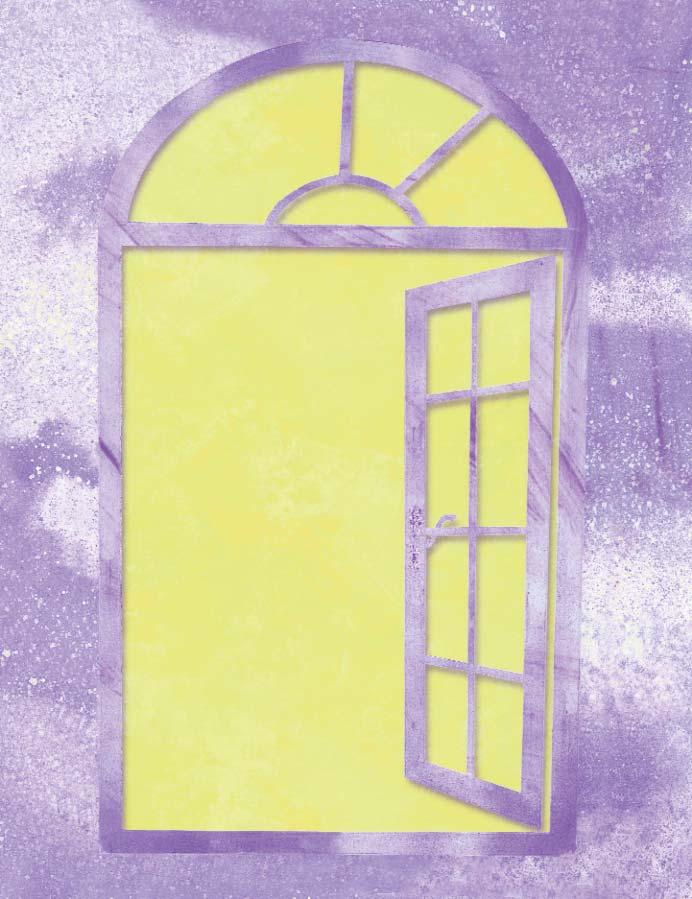 Introduction
By Dovi Scheiner
Introduction
By Dovi Scheiner
We welcome your comments, submissions, and letters to the editor.
Mail: Kosher Spirit
391 Troy Avenue • Brooklyn, NY 11213 Tel: 718.771.0100 • Fax: 718.771.0991
E-mail: editor@kosherspirit.com
RABBI DON YOEL LEVY
Kashrus Administrator
EDITOR: Dovi Scheiner
ASSOCIATE EDITOR: Sara Levy
EDITORIAL CONSULTANTS: Neria Cohen, Shalom Doron
EDITORIAL CONTRIBUTORS: Ruth Benjamin, Hanna B. Geshelin, Baila, Chaya and Rivka Glitzenstein, Yosef Y. Jacobson, Thelma M. Levy, Michoel Moss, Phillip Namanworth, Benjamin Netanyahu
PHOTOGRAPHY AND ART: Linda Rosier, Devorah Shinan
SPECIAL THANKS: Shoshe Ben-Abou, Rikal Fogelman, Yitz Goldberg, Rivka Goldstein, Miri Kamman, Audrey Kashuk, Sara Feiga Mayteles, Dovid Polter, Moshe Rosenfeld, Rabbi Moshe Scheiner, Sara Malka Schlass
All kashrus inquiries:
Mail: Organized Kashrus Laboratories 391 Troy Avenue Brooklyn, NY 11213
Tel: 718.756.7500
Kashrus Q & A: questions@ok.org
~ Laboratories Website: www.ok.org
Graphics and design by SPOTLIGHT DESIGN
Tel: 718.493.2866
E-mail: www.spotlightdesign.com
In honor of the marriage of Devorah Leah and Peretz
COVER ART: Andrew Lichtenstein

September 12, as citizens in mourning gather in Union Square, kindled candles bring to light a fiery likeness of the American Flag.
NOTE: The views and opinions presented in the Kosher Spirit, do not necessarily reflect those of the
We monitored the forecast out of concern for falling showers, but nothing could have prepared us for the prospect of falling towers! The holy Reb Yisroel of Ruzhin once said, “Not only is it announced in heaven whom you will marry, it is also announced in heaven the location, the date and the people who will attend the wedding.” Remarkably, the day chosen in heaven to feature our wedding would play host as well to the most catastrophic hour in American history.
Many disasters are remembered by catchphrases - we all attach meaning to words like Pearl Harbor and Chernobyl. The tragedy of the Twin Towers, will forever be remembered by the date on which it occurred:
9.11.01. The day the Twin Towers were toppled.

9.11.01. The day Esty and Dovi Scheiner were wed.
Late on my wedding day, when I should have been taking a refreshing shower, I found myself weeping bitterly instead, my face bathed in hot tears. I asked my spiritual mentor, “How can I tell my legs to dance as thousands of my fellow citizens prepare to bury their loved ones?” My Rabbi explained that this was not a question of Happiness vs. Sadness, it was a matter of Good vs. Evil.
The events unfolding in our city did not call for surrender, they called for swift retaliation. Terrorists had just torn down a magnificent structure, now it was our calling to help build it back up.
Marriage in Judaism centers on the creation of a Jewish home. A Jewish home is not only constructed physically but is essentially constructed spiritually. A Jewish home is one in which G-d is a dominant partner. Prayer and Torah study, charity and hospitality, form the true foundation of the Jewish home.
So, as rescue workers were sifting through the rubble at the site of the World Trade Center, Esther and I donned our ‘hard hats’ and headed towards our Chupah, just over the Bridge in Brooklyn. With a plume of black smoke suspended in the skies above our wedding canopy, it was clear to both of us that our challenge in life would not be to build a Jewish home, it would be to build a Jewish tower! Hour by hour, deed upon deed, we hope to raise our tower until its turret touches the sky. A lasting tribute to the Twin Towers that will be remembered forever!
By Dovi Scheinerhe horrific events of September 11 ought to serve as an urgent call for the Jewish people to reclaim its mission statement articulated at the moment our faith was born, 3800 years ago.
How did the Jewish faith come into existence?
The Midrash describes the birth of Judaism with the following cryptic parable:
The Lord said to Abraham, “Leave your land, your birthplace, and your father’s house.” To what may this be compared? To a man who was traveling from place to place when he saw a palace in flames. He wondered, “Is it possible that the palace lacks an owner?” The owner of the palace looked out and said, “I am the owner of the palace.” So Abraham our father said, “Is it possible that the world lacks a ruler?” G-d looked out and said to him, “I am the ruler, the Sovereign of the universe.”
Abraham’s bewilderment is clear. This sensitive human being gazes at a brilliantly structured universe, an extraordinary piece of art. He is overwhelmed by the grandeur of a sunset and by the miracle of childbirth; he marvels at the roaring ocean waves and at the silent, steady beat of the human heart. The world is indeed a palace.
But the palace is in flames. The world is full of violence, bloodshed, injustice and strife. Thugs, abusers, rapists and killers are continuously demolishing the palace and its royal inhabitants.
What happened to the owner of the palace?
Abraham cries. Why does G-d allow man to destroy His world? Why does He permit such a beautiful palace to go up in flames? Can G-d have made a world only to abandon it? Would anybody build a palace and then desert it?
The Midrash records G-d’s reply: “The owner of the palace looked out and said, ‘I am the owner of the palace.’ G-d looked out and said to Abraham, ‘I am the ruler, the Sovereign of the universe.’”
What is the meaning of Gd’s response? Britain’s Chief Rabbi, Jonathan Sacks, presents the following compelling interpretation:
Note that the owner of the palace does not make an attempt to get out of the burning building or to extinguish the flames. He is merely stating that He is the owner of the palace that is going up in smoke. It is as if, instead of racing out, the owner were calling for help. G-d made the palace, man set it on fire, and only man can put out the flames.
Abraham asks G-d, “Where are you?” G-d replies, “I am here, where are you?” Man asks G-d, “Why did You abandon the world?” G-d asks man, “Why did you abandon Me?”
Thus begins the revolution of Judaismhumanity’s courageous venture to extinguish the flames of immorality, injustice and bloodshed and restore the world to the harmonious and sacred palace it was intended to be. Abraham’s encounter with G-d in the presence of a burning palace gave birth to the mission statement of Judaism - to be obsessed with good and horrified by evil.

One year ago, on September 11, 2001, we, too witnessed a palace going up in flames.
Yet our palace - unlike Abraham’s palacecould be destroyed because we, the Jewish people, have neglected the covenant crafted between Abraham and G-d during that fateful day, 3800 years ago.
For too long, many Jews have succumbed to the lure of the popular notion that there is no such thing as absolute evil behavior. “Though shall not judge,” has become our cherished motto. We have been taught to
probe and understand the underlying frustrations compelling the aggressor to follow his extreme route.
This sophisticated and open-minded point of view has allowed us to sustain an ethos of boundless tolerance, accepting all forms of behavior as just, since at the core of every mean act lies a crying heart.
Few ideas have been rejected in the Torah with so much passion. Judaism places as its highest ideal the creation of a good and ethical world. Consequently, the refusal to take a stand on what is wrong, results in its victory. For example, a non-judgmental view of a suicide bomber, may appeal to our compassion and understanding, yet in reality it is a display of extreme cruelty to the innocent victims who will die at the hands of frustrated militants.
Judaism, in its impassioned attempt to turn the word into an exquisite palace, created absolute universal standards for good and evil. These standards are defined by the Creator of the universe and are articulated in His manual for human living, the Torah. Taking the life of an innocent person is evil. No ifs, buts or why’s. The killer may be badly hurting but that never justifies the evil of murdering an innocent human being.
By Yosef Y. JacobsonYet, tragically, we have become numb to our mission statement. For six years Israel has displayed tolerance toward terrorists, neglecting our most cherished doctrine that the preservation of human life reigns supreme over every other consideration. The result of our moral confusion is devastating: Thousands of innocent Jews and Arabs are now dead and terrorists the world over have learned that they can continue their despicable work without serious consequences.
Good people of the world are waiting to be inspired by our four-millennium long heritage of standing up to evil and banishing it from G-d’s palace.
YosefY.Jacobson,oneofthe mostsought-afterspeakersin theJewishworldtoday,haslecturedtoJewishandnon-Jewish audiences in six continents and twentystatesandistheauthor ofthetapeseries“ATaleofTwo Souls.” You can e-mail the authoratYYJacobson@aol.com
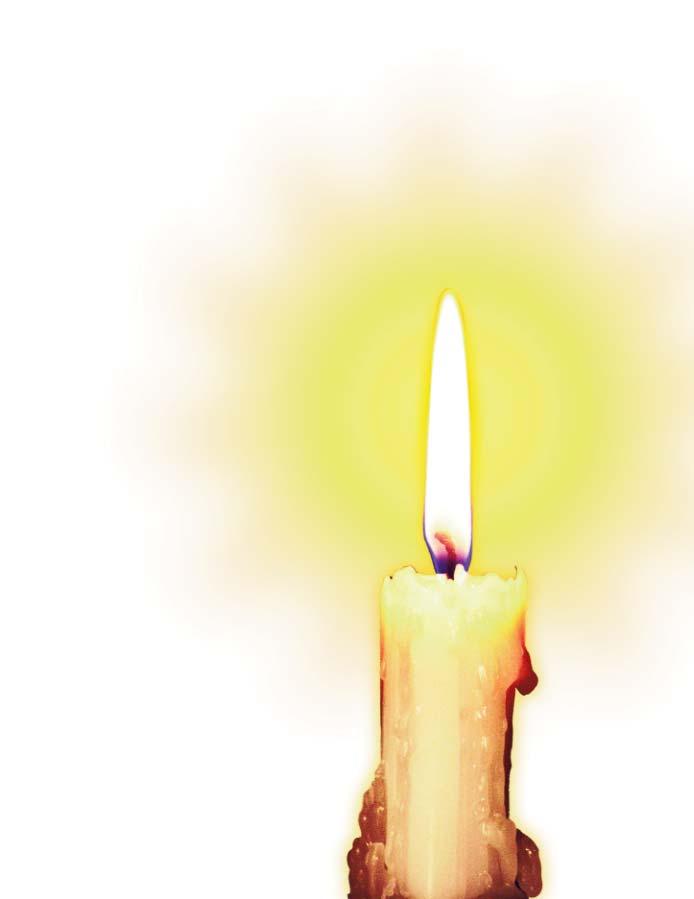
esides fighting our obvious battles with terrorism, we have to fight on one other front, the battle for public opinion. The terrorists are very clever and their principle weapon against us, other than bombs, is propaganda. That is the one element Arafat has which distinguishes him from other terrorists, he’s got P.R. Arafat is a Bin Laden with P.R. and this works in Europe, North America, and it definitely works in the U.N.
The terrorists always cite a few main ideas in their propaganda speeches. They say, “We’re not the terrorists, you are the terrorists! You’re the guys who are killing civilians; in fact, you are killing more civilians than we are killing. Anyway, one man’s terrorist is another man’s freedom fighter,” and so on. We have all heard this type of propaganda.
The first thing we have to do is dispel this deliberate obfuscation. Terrorism is not defined by the identity of its perpetrators, or by its cause, real or imaginary. Terrorism is not defined by what they profess to be their goals; terrorism is defined by one thing alone, by the nature of the act!
Terrorism is the deliberate and systematic attack on civilians. It is not the unintentional harming of civilians that accompanies every war. In 1944 the British air force set out to bomb the Gestapo headquarters in Copenhagen, a perfectly legitimate target. But the British pilots missed, and instead of hitting the Gestapo headquarters, they hit a children’s hospital nearby and 83 children were horribly blown to death. That incident was not called terrorism, but instead was acknowledged to be an unintentional accident.
In contrast, the terrorists we know don’t hit children by accident, they hit them deliberately, again and again and again. They bomb our coffee shops, our hotels, our busses; they put children in their line of fire and purposefully squeeze the trigger. During these acts of terrorism, they kill soldiers too, but essentially aim to kill innocents.
Terrorism is quickly followed by a deliberate attempt by terrorists to hide behind their own civilians, seeking to purchase immunity. Israel has shown much restraint. We have an enormous
air force that we do not use, or use only for pinpoint strikes. In fact our reaction is very different from the way Britain and the United States acted in Afghanistan. They first cleared it out; they gave proper warning, and then leveled any civilian area where the terrorists could encamp themselves. In the end they sent in the ground troops, and even then on a limited basis because they did not want to incur casualties within their own ranks.
Israel did not use her air power in order to prevent civilian casualties amongst the opposition. Israel went in, putting our soldiers at risk and some died.
It is important not to fall for the lie that Israel targets civilians. Terrorists hide behind their civilians for immunity. We do however target terrorists for our very survival; unfortunately, on occasion unintended civilian causalities result.
The terrorists also say, “Well, maybe we do attack civilians, but it is because we have no other choice. We’re frustrated by the deprivation of our national or civic freedom. If you want to really fight terrorism, you don’t fight it, but get rid of the root causes of terrorism.” I am sure you have all heard this argument. They say, “To solve terrorism, get rid of the deprivation.” This means, to give into the terrorist demands, all of them, and then terrorism will disappear.
This argument can only be foisted
at the beginning of the 21st century, when you have vast numbers of people whose sense of history extends back to breakfast.
By Benjamin NetanyahuIn the modern period of the 19th and 20th century there have been endless conflicts for national liberation, for civic freedom and civic equality. If the root cause of terrorism was the deprivation of these freedoms we’d expect to see rampant terrorism in those struggles, but we hardly see any at all. In the 19th century there were many nations who fought for their national liberation. The Poles fought against the Russians, the Greeks against the Turks etc., but they never attacked women and children and defenseless civilians. In the 20th century Gandhi didn’t use terrorism against Britain in his fight for India’s independence. Martin Luther King didn’t use terrorism fighting for civil equality for all Americans. Those two leaders actually preached non-violence. The people of Eastern Europe didn’t use terrorism or fighting to bring down the Berlin wall. Even the worst occupation in history, the Nazi occupation of Europe never saw the French resistance resort to murderous terrorism. There were plenty of opportunities as the wives and the children of collaborators and even the wives and children of German officers were stationed in occupied France within reach. Why is it that so many nations didn’t feel the need to use
terrorism? The answer is very simple, because they were true democrats (with a small ‘d’). They believed in the democratic ethos which says that every person is born with inalienable rights; that a baby is born with inalienable rightsthe first one being the right to life and it doesn’t make a difference if it’s a Jewish baby, an Arab baby or a Tibetan baby. Because of that inalienable human right, they had to curb the way they waged their struggles.
There are limits to the use of power; there are moral laws that govern human action. This is what the democratic mindset stipulates. The mindset of a terrorist is different, those who practice the deliberate slaughter of the innocent, they don’t believe in any rights of men. They believe something entirely and diametrically opposite. They believe in a higher cause so totally, that it allows them to forgo conventional morality. It could be a racial cause, or an ethnic cause, or a political cause, it doesn’t make any difference, the cause is so total that it calls you to brainwash your disciples so that they abandon conventional morality, crush humanity to the ground and blow up a bus full of babies if necessary.
This behavior is called totalitarianism, the root cause of terrorism. In mod-

was an action in which two women and two children were killed. Is it true? If it is true, was it deliberate or accidental? If it was deliberate, immediately put those responsible on trial.” Can you imagine Arafat sending a telegram like that?
Begin used to call the British military authorities and tell them to take civilians off the trains because they would be blown up. Could you imagine Arafat doing that?
Arafat glorifies these killers, he lionizes them, he says they’re heroes. He names public squares in their honor. He has suicide kindergarten camps that teach three-year-old children to become human bombs.
These terrorists are not the products of oppression; they are in fact the carriers of this oppression. We can clearly see what happens when those who practice terrorism do come to power. They do not establish democracies, but instead establish dark, dank, corrupt dictatorships and use terror against their own people as well as against their enemies.
Middle East in 1948 when the Arabs attacked the embryonic Jewish state.
More recently, only two years ago, when an Israeli Prime Minister offered (scandalously to my mind) unbelievable concessions - willingness to dismantle all of the West Bank and Gaza, all of Judea and Samaria thus uprooting dozens of settlements - Arafat just rejected it. It reminds me of Oliver Twist, but he didn’t even say, “Please sir, I want some more.” He said “More! More! Akko, Haifa, Ramla, Lod.” Because the ideological banner that Arafat has for his particular kind of totalitarianism, is not a State next to Israel but a State instead of Israel. He preaches to his own people the doctrine of destruction of Israel using the technique of suicide and mass murder.
What can we do against this endless vilification and distortion of the truth? We can only uphold the truth, the facts of recent and ancient history, the facts of today and yesterday. These are the only weapons we have against this vilification.
the Ayatollahs, the Taliban in Afghanistan and eventually Arafat in Arafatistan. It’s all the same idea, the cause changes, but the system is the same. Totalitarianism involves the complete obliteration of morality for the sake of a twisted cause. This is the root cause of terrorism.
In the thousands of acts of the Jewish underground forces, maybe two incidents could be construed as terrorism under our definition. There’s a famous telegram in which Jabotinsky, the ideological father of the Irgun, cables from London: He said, “I understand there
Terrorism is the carrier of oppression, it is not the result of oppression, and it is certainly not the result of any oppression we have done, because we have done nothing. They are changing the facts of past history. Arab propaganda uses the oldest technique in the book. Called the reversal of causality, the Arabs substitute the results of their aggression for its causes. They say that they’re attacking us because of the settlements - fine, except that there wasn’t a single Israeli settlement in Judea, Samaria or Gaza in 1967 when they first attacked us. That was how we got into those territories in the first place; our being there in recent times is a result of Arab aggression, not the cause of their aggression. As people believe them, this version takes on a ‘facade of truth.’ Similarly, between 1948 and 1967 when you asked the Arabs why they were attacking Israel, they said, “It is because of our refugees.” But there wasn’t a single Arab refugee in the
When I came to serve as Israel’s ambassador in the U.N. I was asked by a former soldier of mine to come and visit the Lubavitcher Rebbe on Simchas Torah. During that conversation, the Rebbe said, “When you go into that house of lies (that’s what he called the United Nations) remember that in the darkest hall, if you light one candle it will shed a light that will be seen by all from a great distance. What you must do is light a candle of truth against all those lies.” And that’s exactly what I have tried to do ever since.
I think each one of us has the opportunity in our daily lives to dispel myth and distortion, either in a letter to the editor, in conversations we have with our children, or in a phone call. Possibly the worst and most pernicious affect of Arab propaganda is its affect on our own people. So become educated with the facts and then stand up for the truth.
Light a candle for truth.
BasedonapublicspeechbyBenjamin Netanyahu,givenatthePalmBeach Synagogue,Florida.
ern times, from the day that Baqunin put this theory on paper, it was taken up by Lenin, Stalin, Hitler,
BailaandChayaaretwins,aged11,and their sister, Rivka is 10.
t’s 8:30 in the morning. The school bell rings and students enter the classrooms, but not us. We usually get to school during or after the morning recess.
We live in Ma’ale Efraim, which is located “behind the green line.” Every day we travel about four hours (back and forth) to school in Jerusalem, with our brothers and sister. The roads in our area have seen very hard times. The way is very narrow and hilly. To begin with, the Arabs only threw stones or put tires and boulders in the middle of the road, but since last year, they have been shooting and putting explosives or bombs on the road instead. We used to get to school on time because it actually takes only an hour to Jerusalem, but since it became dangerous, we travel by “Eged” bus, which is bulletproof.
The bus stops off in all the settlements and army camps along the way. It goes up and down a long winding hill to each of the settlements, so the trip is not easy at all. Many times, the bus is over crowded with soldiers, so we don’t even have place to sit. If we had a private bus, we would get to school on time and sit comfortably, but it’s better to travel safely. The truth is that even the bulletproof busses were shot at, and unfortunately, people were wounded and killed. Whenever there is a shooting or explosives, the army closes off the roads, and then we have to travel by a different route.
There are also “Machsomim” on the way, where the soldiers stop every car and check them, and then the bus waits a long time on line. Once, at the entrance to Jerusalem, we
Our trip to school always shows us how G-d watches over us. We have seen so many miracles. Many times, there was shooting a few minutes before or after we passed a certain place. Also explosives went off on the road, but always missed the bus we traveled on.
We used to take 10 “agurot” to school for charity every day, but since it became dangerous, we always take 30 “agurot.” 10 we put in charity on the bus, (we always travel with a charity box), 10 we put in school, and 10 we put in charity at home as soon as we arrive. This way, we are sure that we will have a safe trip. Even so, we must admit, that the security situation does have an effect on us. When we get off the bus, we have to walk about 20 minutes to get to school. Last week, while we were walking, we suddenly noticed a man on a motorcycle that stopped near a house and threw something towards the house. Then he went to the next house, and did the same thing. All three of us were quite scared, because we thought that he was a terrorist who wants to kill Jews (Heaven Forbid), and we started running away. Only afterwards, we realized, that he was just throwing newspapers into the houses.

This is how most people in Israel feel. For example, we always take a cellu-
lar phone with us because of the situation. One day, the phone fell out of our briefcase, and we didn’t realize right away. Afterwards, we found out that the people who saw it were afraid that it was a bomb. Also, anyone who sees a bag or anything on the sidewalk, in a store, on a bus, etc., right away thinks that it may be an explosive.
Since we spend so much time on the bus, we try to use this time to speak to the people or soldiers on board about keeping Torah and Mitzvoth. Our teachers don’t understand why we can’t do homework on the way, but the trip is so winding and hilly, that it’s too hard to concentrate and if we try to read we get nauseous. Instead, we speak to the people. They ask us all sorts of questions, like - “Aren’t you hot in the summer - why do you wear long sleeves and socks,” or “Do you really believe that Moshiach will come.” Most of the people on the busses are soldiers or people who don’t know much about Torah and Judaism. We try our best to explain to them how important it is to serve Hashem and how happy we are to be reli-
waited for so long, that by the time we got into the city, we didn’t even get to school, we just went right to the bus that brings us home.
gious, even though sometimes it can be a little difficult. We tell them that Moshiach is ready to come! Usually, we don’t know what came out of the conversations, but once we did find out. Our older sister has a friend who runs a Tzivos Hashem club in Jerusalem for girls who don’t know about a Torah way of life. One day, a new girl began to come. She told the Madricha (counselor) - “Do you know why I decided to come? Believe me, I never thought I would be coming to this kind of club. But one day, when I traveled on a bus from Jerusalem to Tiberias, I met some girls who live in Ma’ale Efraim and we had a very interesting conversation, and because of that I decided to come.” The girl was surprised that the “Madricha” also knew us… That was real Divine Providence!

Most private families cannot afford to get a bulletproof car, therefore there is a “G’mach Shachpatzim” for people who live in “Yehuda and Shomron.” A “Shachpatz” is a very heavy metal bulletproof vest, which you can put on, and they have all sizes.
When we
wear a “Shachpatz” we simply can’t move the whole way, and it feels very heavy on our shoulders and on our backs. But we don’t complain, because we see how G-d helps us and watches over us every day. But unfortunately we keep on hearing the sad and scary stories of all the people who were wounded, or killed, or lost their parents. It makes us very worried and sad, and we immediately recite Psalms for them.
One thing is for sure.
Because of the security situation, so many people have started praying and begging Hashem that we need Moshiach immediately! Even people in Ma’ale Efraim who used to think that it is just a dream, today, they tell us - “Nu, what’s with Moshiach? Something has to happen. Things can’t continue this way!” We know that if Jews around the world will really ask Hashem to bring Moshiach, he will come immediately! So anyone who reads this article and wants to help us, should try to tell all the people you know to pray and do Mitzvoth so that Moshiach will come TODAY!
uring the French revolution, Voltaire and Rousseau were faced with a curious dilemma. Amongst their writings on tolerance, they had inserted copious anti-Semitic commentaries, but were still trapped into unwillingly tolerating the Jews. Their own revolution was based on the principles of “Liberty, Equality and Fraternity” which needed somehow to apply to the Jewish masses as well. September 1791 brought about a bitter battle in the halls of the new National Assembly of France as a law of complete emancipation of the Jews was drawn up.
Historically, France has always been virulently xenophobic and often antiSemitic. (A point with which Alfred Dreyfus would agree.)
Recent fears of a united Europe, the advent of the Euro currency and massive immigrant populationsespecially Muslims - pouring into France, have Francophiles worried about their republic. France today has the largest Jewish and Muslim population in Europe, with 5 million Muslims and 650,000 Jews.
Leah, a French ex-patriot living in New York, looks uncharacteristically solemn as she describes a recent visit to her family in France. She had always felt that her fellow Frenchmen were faintly anti-Semitic but tolerable. It was over the Passover holidays and tension was building in the Middle East. Arafat’s compound was under siege and so were the Jews of France. Her husband and brothers had to face spitting and hisses of ‘dirty Jew’ on the way to synagogue.
It has been suggested to those living in France that they should try to look less Jewish. But the Jews of France feel this is their home - they were born in France and love France, but are even more proud of their Jewish identity. “Why should they cover up their kippah?” asks Leah. The way a Jew answers a Jew with a question, I reply, “You are right. Why
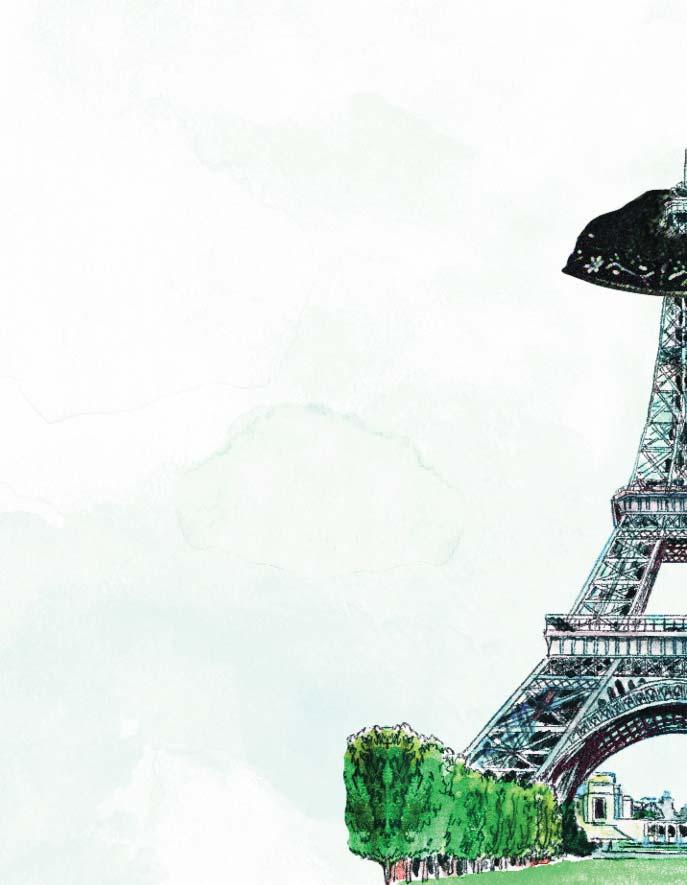
should they?” There is no answer.
Leah told me more horror stories. Her 12-year-old niece was walking from the school to the gym with classmates and teachers, when thugs began attacking them throwing rocks. A young girl was hit in the head and the blood began to flow.
She says the propaganda makes it ten times worse. Coverage of Israel mostly shows sad Palestinians burying their dead. Suicide bombing reports always speak only of the oppression of the Palestinians and how they heroically blow themselves up on “special operations” for the sake of their people. Zionism is commonly referred to as a form of Nazism. The French have always been a bit uncomfortable with the
attackers wielding metal bars and sticks attacked a Jewish amateur soccer team. The 15-year-old goalkeeper suffered a head injury and was treated in the hospital. The sports center was defaced and fires were lit, but they went out on their own. On April 7th, there was an arson attack at Gan Pardes Jewish School during the night. On April 5th a small bomb was found in a synagogue in Strasbourg, which fortunately did not ignite. Another bomb was found in the Jewish cemetery and arsonists also set fire to the prayer pavilion there. March 31, a gunman opened fire on a kosher butcher shop in southern France; a synagogue was gutted by fire in Marseille; another synagogue was attacked in Brussels; and a young woman was confronted in the subway, by chants of, “Dirty Jew, we are going to finish the work of the forties…all of you will burn.” The list of incidents is endless but few suspects have been found.
Jewish people, who can never be totally French due to their loyalty to Jerusalem. There is a feeling amongst the French political far left that the Palestinians are the new proletariat, and they are portrayed by the French media as freedom fighters deprived of their rights.
Leah is not imagining the anti-Semitic tension. Other incidents have occurred, unthinkably similar to events leading up to the Holocaust.
In Bondy, France on April 11th, hooded
Police say perpetrators are probably a small number of young, second and third generation French citizens of NorthAfrican descent who sympathize with the Palestinians and want to get in “on the action.”
Sam Pisar, a Polish born Jew who sur-
By SaraIt was over the Passover holidays and tension was building in the Middle East. Arafat’s compound was under siege and so were the Jews of France.
vived Auschwitz and two other concentration camps and has lived more than half his life in France, says he never thought he would face a time when Jews were persecuted again. He believes the climate of antiSemitism is as bad as it was just before World War II. He said, “Not enough is being done to stem the whole thing, people are just letting it go and praying that it will not explode.”
The French political leaders are no lovers of the Jews. The government controls the heavily biased media. It was even reported recently, that during a conversation about the Middle East crisis with Conrad Black, (owner of the Daily Telegraph newspaper), French ambassador to Great Britain, Daniel Bernard spoke about “That (expletive) little country Israel, that is smaller than three French ‘departments’ (provincial districts) is causing so much worldwide trouble.” The story yielded denials and editorials mostly on free speech but largely ignored the escalating contempt for the Jews of France.
The government has belatedly officially sided with the Jews in the attacks, but the French are generally known for
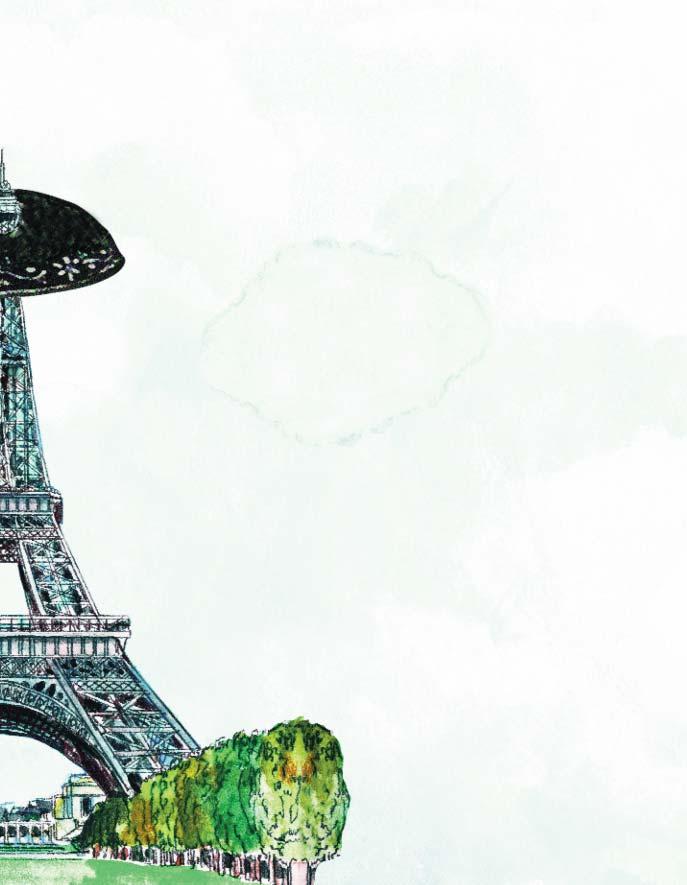
favoring the Palestinians.
French Prime Minister, Lionel Jospin, did make a statement saying: “Any act of violence committed against Jews is committed against our whole national community. It is a violation of our Republic’s
“In the pay of Jewish organizations and particularly of the notorious B’nei Brith.”
Catherine Mégret, who stood in for her husband, Bruno at a meeting, (the number two leader of the FN and often described as the party’s brain) repeated another Le Pen statement that “there are differences between the races… there are differences in the genes… there are simply too many immigrants, and they make who knows how many children whom they send into the streets and then claim welfare…”
And so it goes on…
fundamental principles.”
most
President Chirac also made a statement: “I have come here to convey to the Jewish community of France, my indignation, my sense of solidarity and above all my strength of feeling following the attacks which, lately in everincreasing numbers and more especially in the last few days, have been directed against persons, property and symbols of the Jewish community. These acts are utterly unimaginable, unforgivable, indescribable, and must be condemned and punished as such. They are unworthy of France, they are unworthy of the French people.”
For some, the statements are just more and more empty words.
Then there is the ultra-nationalistic National Front (FN) party and the blatantly anti-Semitic comments by its leader, Le Pen. Le Pen’s growing political support shocked the world. Last February, Le Pen accused Chirac of being
It says in Tehillim (Psalms), “His mouth is filled with false oaths, with deception and malice; under his tongue are mischief and iniquity. He waits in ambush near open cities; in hidden places he murders the innocent” (Psalms 10:7-8). This could be a quote about the suicide bombers and the propaganda machine that supports this behavior, however it was written by King David thousands of years ago. AntiSemitic propaganda is not new, it has all been said before. We just need to be aware of the threat to our brethren, particularly now in Europe.
Leah does not want to go back to France anytime soon. She just prays that her family and community will be safe. Her parents will not move to Israel, for their whole life is in France and they feel they are too old to start again somewhere else.
The words of Tehillim also offer us comfort: “G-d is the champion of the orphan and the downtrodden, so that he shall no longer be terrified of an earthly mortal” (Psalms 10:18).
May G-d grant us Moshiach (Messiah), the only peace process that will be everlasting.
SaraLevyisassociateeditorofthe KosherSpirit.
Suicide bombing reports always speak only of the oppression of the Palestinians and how they heroically blow themselves up on “special operations” for the sake of their people.
 By Hanna B. Geshelin
By Hanna B. Geshelin
he route of every Jew who becomes observant is unique. One of the turning points on my journey occurred at a large Iowa university with a miniscule Jewish population, where during my freshman year of 1963-64, I was the only undergraduate female who identified herself as Jewish. Among my roommates during my first term was a junior taking a child development class on cultures. She decided to join the committee researching the Jewish culture because she had a ready-made resource to interview - me. As a fourth-generation American descendent of Reform Jews who emigrated from Germany before the U.S. Civil War, I didn’t know much about Judaism, but I did my best to answer her questions. The relief that I felt when she finished questioning me was short-lived, however. Every term after that, the child development professor gave my name to the committee studying Judaism. To meet this challenge, I would have to learn something about my heritage.
The college library had two shelves of books on Judaism. I started at one end of the upper shelf and began reading. They gave me basic information about Jewish history, tradition and beliefs. With the help of the books I managed to get through th
questions during the winter term. Then, in the spring of my freshman year, I met Janet.
Janet was a Southern Baptist from a small town in Iowa. Like many students at college, she came from a family for whom church was a major focus. Her beliefs guided her behavior in all aspects of her life.
I was the first Jewish person she’d ever met. She told me that she had chosen to write about the Jewish culture because she wanted to learn about the origins of her faith. Could she come with me to synagogue?
The town had a small Reform congregation that met Friday evenings in the parlor of one of the churches. I agreed to take her, and as we strolled through the quiet streets she asked me about my religious life. “Where do you eat?” she asked suddenly.
Mystified, I gave the name of the dorm dining hall.
“How do you manage?” she asked.
“What do you mean? I just eat.”
With an edge to her voice she said, “How can you ‘just eat?’ We get ham, pork or shellfish three or four nights a week, and most of the rest of the time there’s meat and milk at the same meal.”
“Oh,” I said confidently, “You mean kosher. I’m Reform, and we don’t keep kosher.”
“You don’t keep kosher? But from everything I’ve read, kosher is one of the cornerstones of Judaism. Why don’t
you keep it?”
I shrugged. “I don’t know, we just don’t.”
Janet stopped and turned to face me, hands on her hips. I can still picture her standing there in the light of a street lamp, dressed the way she would for church in a navy suit, a small white hat and white gloves. She looked me up and down as though I were a bug on a pin. Then she said words that still reverberate through my mind: “If my church told me to do something, I’d do it.”
In the long silence that followed, I rolled the words over and over through my mind. And I wondered, why did the Reform movement say keeping kosher wasn’t important? I decided to find out.
The next day I found, on one of those shelves of Jewish books, a history of the Reform movement. Breaking bread with others, said the book, is a universal gesture of friendship and goodwill. Keeping kosher prevents Jews and non-Jews from breaking bread together; thus it prevents casual communion between “us” and “them.” When Jews stop keeping kosher and eat non-kosher with their neighbors, anti-Semitism will end and Jews will be fully accepted into mainstream society.
I thought of the Jewish history I’d been reading, of Moses Mendelsohn and the Emancipation; of my mother’s family, which hadn’t kept kosher in at least four generations; and I thought of the Holocaust, which began in
Mendelsohn’s and my greatgreat-grandparent’s home-land, Germany. I turned to the title page of the book and saw that originally the book had been published in German in Berlin in 1928.
Maybe in 1928 German Jews could say that eating with nonJews would end anti-Semitism. But they were about to be proved disastrously wrong. Could I continue to eat in a non-Jewish fashion, when the reasoning for permitting Jews to eat treif was based on a complete fallacy?
“If my church told me to do something, I’d do it.” Janet’s words took one end of my Yiddishe neshama and the book’s glaring fallacy took the other end, and they shook me until I had to sit down, right there on the floor in the library stacks. When I stopped shaking, I knew that until I could find a good reason, a true reason, to not keep kosher, I had no choice. I was a Jew, and the Jews kept kosher. It was that simple.
My complete transformation from a secular to a Torah observant Jew took many years and many more lessons in faith. But my first big step began that Shabbat night, when a Christian girl challenged me to stand up and act like a Jew.
Hanna Bandes Geshelin has been a social worker, technical writer, librarian, andstoryteller.Shelivesin Worcester, Massachusetts with her husband.
Mrs. Thelma M. Levy,wifeofthelate RabbiBerelLevy OB”M and matriarch of the ~ Labs, sharesherthoughts ontheorganization she knows best.
y husband, Rabbi Berel Levy OB”M, was a great thinker. From the moment he first got involved in kashruth, in the 1960’s, he envisioned an efficient kashruth organization, living up to the highest standards in Jewish law and also working seamlessly with food companies, facilitating a wealth of strictly kosher products. In 1965, he assumed leadership of the ~ Labs. At the time, we were certifying only a small number of companies, but Rabbi Levy entered the industry with a tremendous energy and awareness of how important and integral the kashruth movement needed to be.
Rabbi Berel Levy’s reputation spread very quickly, his outgoing personality and strong principles instilled confidence in others. He possessed an incredible mind that retained information much like a computer, about all the companies and ingredients we certified. Of course we had files, documents and kosher letters but he rarely had to go to the file. At first, Rabbi Levy did everything himself, I did a bit of typing and billing, but he called the companies, inspected the factories, and supervised all correspondence. Almost overnight, we started to grow rapidly, and soon we began to branch out beyond our local metropolitan area.
Shortly after he took over the ~ Labs, Rabbi Levy began to travel. During his business trips to six continents, he would make a concerted effort to educate the people there about their Jewish heritage. He would teach people about Shabbat, help communities to build Mikvahs and aid in preventing intermarriage.
The kashruth industry requires a comprehensive knowledge of chemistry, knowledge that Rabbi Levy promptly acquired. Understanding how any single food item is produced is complicated. You have to know the composition and source of each ingredient, as well as any processes it may undergo. To inspect a factory, besides knowledge and expertise, you have to be very inquisitive. I went with Rabbi Levy on a few inspections and he had to go into the stock room and supply room, look around, ask questions and write down what he had to check later. Nothing passed him by.
One of the primary policies Rabbi Levy implemented was the policy of non-solicitation of companies. If a company approaches us with interest in our certification, we set down our strict standards. Were we to approach a company and ask for their business, if they do something wrong later on and we protest, they can point out that we wanted their business. They did not initiate the relationship and therefore we should not interfere with their desire to compromise on various issues. People have to come to us, approaching us shows readiness to adhere to our standards. It is the only way to operate according to Jewish law.
As our organization continued to grow, it became increasingly difficult for my husband to run solo. We asked our son, Rabbi Don Yoel Levy to join us in 1977. Over a period of seven years, since the time of his marriage to Malka Deutsch in

1970, Don Yoel had been learning full time in Kollel in Kiryat Malachi, Israel. He was very focused and learned constantly.
At first, Don Yoel resisted our invitation to join the ~ Labs. He had hoped to serve as a community Rabbi and educator, reaching out to Jews with limited religious education. When he asked the advice of the Lubavitcher Rebbe, the Rebbe told him that kashruth is a very important mitzvah to spread.
In 1987, Rabbi Berel Levy passed away. After his death, a client told me that he would have given anything if he could have only gone into Rabbi Levy’s mind for a few minutes, just to see the tremendous knowledge stored there.
My husband left behind a surging, vibrant kashruth organization, which due to his principles, solid foundation and the integrity of our son, continues to grow.
In 1996, we built our own expansive office building. When we moved in, we had extra offices for the first time. We have steadily grown bigger, hiring new employees, buoyed both by the confidence people have in our strict kashruth standards and all the new companies who want ~ certification. The extra office space has somehow evaporated. I don’t know where we are going to push out the walls.
Although we are as strict as ever, ever more companies are joining. Once they come, 99% of them stay, due to our technology, superbly reliable kosher certification, professionalism and prompt service to our clients.
I think my husband would be very proud of our organization as it is today.
It might appear my thinking’s convoluted at its best. But for me, it’s nothing less than a spiritual quest. Each person in this life is given his or her own test and for me it’s been to worry.
I worry about tomorrow, I worry about today I worry that you’ll leave me, Then I worry that you’ll stay. I can’t make up my mind Because I know that either way All I’m gonna do is worry.
I worry about my job, I’m afraid I might get fired. It’s really so ridiculous I haven’t even been hired. Why should I let that stop me? When I’m obviously inspired to worry, worry, worry.
Oooooh I’m a black belt in panic and I find that peace of mind Only tends to make me manic.
My friends say I should loosen up With all that I have learned. But the fact that they have mentioned it, leaves me concerned. And if it’s only my own craziness, At least its been well earned. Ooh, I worry.
Oooh it’s not really my profession, Friends say it’s a compulsion But they’re dead wrong

It’s merely an obsession.
Doctors say that worry implies a lack of trust But I never trusted doctors’ And I don’t see why I must.
When every year some rotten flu turns all their theories into dust, Ooh, I worry.
But what if I’m wrong Ooh that would grieve me, And what if I’m right. Where exactly does that leave me.
Well I worry about the planet, the water and the air. I’m dressing for success, But I’m not sure what to wear The only thing that I don’t worry about Because it’s always there Ooh, ooh, is my worry.
How do I look tonight Ooh, ooh, I worry.
Phillip Namanworth is a singer/songwriter who has written songs for Sesame Street, Nickelodeon, Saturday Night Live, movie scores, theatre and various recordings. He has created two CD’S of his cabaret songs. E-mail: Namsoup@aol.com
The past is behind us. The future has yet to come. The present zooms by in the blink of an eye. So why worry? — R’ Avraham Even Ezra
he concept of a ‘materialistic spiritualist’ may sound like a quintessential oxymoron, yet that’s precisely what we are on Rosh Hashanah.
Rosh Hashanah is the anniversary of the creation of man. On the first day of his life, Adam, the first man, encouraged his fellow creations to acknowledge the reality of a Higher Being: “Come! Let us prostrate ourselves and bow, let us kneel before G-d, our Maker.”1 Each year on Rosh Hashanah, we relive this experience by acknowledging the supremacy of the Divine. We call upon G-d to involve Himself in our existence, enjoining Him to “reign with glory over the world in its entirety.”
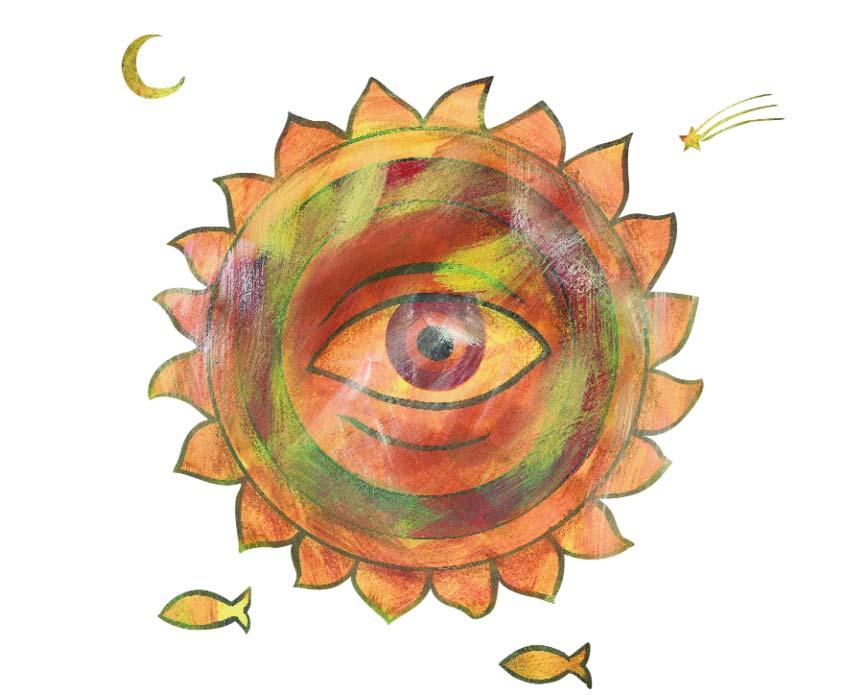
Simultaneously, since Rosh Hashanah is the day on which G-d assigns us our annual financial allotment, we pray also for our material needs.
These dual realities appear contradictory.
pleas for material plenty might appear to be a desire to satisfy his physical self, in reality they are motivated by the workings of his soul. Commenting on the verse, “Hungry as well as thirsty, their soul fainted within them,”4 the Baal Shem Tov explains5 that the physical hunger and thirst of the body is rooted in a spiritual craving of the soul, a desire to release the G-dly sparks trapped within a given dish or drink.
So went the retort of Hannah before Eli the Priest: “I have drunk neither wine nor strong drink, and I have poured out my soul before G-d.”6
In our desire to establish G-d as King over all creation, it is incumbent upon us to follow His will regardless of concern for our personal benefit. This self-negation before a Divine ruler seems to leave little room for individualized pleas for the allocation of our material needs.
Indeed, this awkward juxtaposition calls into question the essential compatibility of our material and spiritual spheres. When striving to carry out the will of his Creator, is man justified in requesting the fulfillment of his personal desires?
Eli the Priest said “No!” In the Haftorah of Rosh Hashanah, a long childless Hannah poured out her impassioned plea to G-d to “give Your maidservant male offspring.”2 Eli the Priest, observing this
scene at the Sanctuary in Shiloh, was filled with disapproval, deeming Hannah’s mention of her personal needs while standing before G-d a form of self-intoxication. “How long will you be drunk?” he censured Hannah, “remove your wine from yourself!”3
However, for a Jew, the material is really a means to a spiritual end. Requests for prosperity and plenty are therefore consistent with the goal of establishing G-d’s supremacy throughout creation. By assuming ownership of a physical object and utilizing it in one’s service of G-d, the Jew succeeds in expanding the G-dly domain to include this article as well - his material possession newly spiritualized.
Whereas on a conscious level, man’s
Hannah argued that her prayers were not rooted in her sense of self, but in her soul; not born of a selfish wish, but of her need to serve G-d selflessly. This truth was evidenced in Hannah’s pledge to dedicate her offspring to the service of G-d. She promised that if G-d fulfilled her request and gave her a son: “then I shall give him to G-d all the days of his life.”7
Registering Hannah’s response, Eli adjusted his tone in support of her prayer: “Go in peace! The G-d of Israel will grant the request you have made of Him.”8 With these words, Eli the Priest forever afforded credibility to the lifestyle of the materialistic spiritualist.
1. Psalms 95:6.
2. 1 Samuel 1:11.
3. Ibid. 1:14.
4. Psalms 107:5.
5.KesserShemTov,Siman194(25,3).
6. 1 Samuel 1:15.
7. Ibid. 1:11.
8. Ibid. 1:17.
The hall looked wonderful! The caterers had truly done a great job despite the limited budget. Nothing was lavish, it couldn’t be. Yet everything looked its best. Pristine white tablecloths, fresh flowers, and gleaming silverware… every detail gave testimony to the fact that there was an important Bar Mitzvah celebration in progress.
David looked around, overwhelmed that all this was done just for him, to celebrate his Bar Mitzvah. His immediate family, friends and community had been invited. David had been a little disappointed that none of his aunts and uncles from Israel had been able to attend but it had been impossible, especially as it was two weeks before Rosh Hashanah, and the beginning of a new school year for his cousins.
In his modesty, he felt as if he were just a part of the scene, hesitant to claim his place as guest of honor. His father walked over to him and patted his arm, “Come, David, come with me to the front of the hall. We have to shake hands with all the guests.” David began to suggest that maybe his father should join his mother there without him, but with a sigh he realized that there was no way out of this one.
But it was not uncomfortable standing at the hall door welcoming people who turned to him with bright smiles and wishes of Mazal-tov. Most pressed gifts or envelopes, some bulging with money, into his hands. He immediately passed everything on to his father looking slightly abashed.
He was glad that the Torah reading part of his Bar Mitzvah was over. Shabbat morning had been slightly terrifying as he waited to be called up to the Torah to read his portion and make the blessings. He had been practicing for nearly eight
months, but that did not seem to matter in the shul, full of congregants and friends. His voice had seemed to echo as he took upon himself to do all the Mitzvoth that a man must do.
His mind went back to his first lesson with the Rabbi’s son. At that time he had not even dreamed that he would begin to change his life and his lifestyle. He had never dreamed that his Bar Mitzvah would come to mean what it was supposed to mean, that he would accept upon himself all of Torah and Mitzvoth. He had been enthralled by his lessons with Yanky, and soon he had realized that he was not only learning his Torah portion, he was learning to be an observant Jew. The fact that Yanky was only three years older than himself and someone who lived according to all he was teaching made David’s lessons more meaningful.
Most of the guests were in the hall. There was now only a trickle and even that was stopping. He frowned. Benny, the new boy in his class had not arrived, and yet he had been so excited that he had been invited. They had hit it off right away and Benny had promised he would be here. As his parents turned to go back into the hall, David walked outside and stood looking right and left at the many cars parked in the parking lot.
A car was turning into the parking lot and stopped right in front of the shul entrance. Benny got out and David beamed, walking quickly to meet him. “Benny, I am so glad you have come. I was looking for you.”
Benny looked embarrassed. Though dressed for the Bar Mitzvah in a similar blue suit, he hung back not wanting to come in. “David,” he said. “I don’t know if I will be welcome here, not by your father anyway.” David looked at him, obviously shocked. “My father?” he exclaimed in surprise. “Why on earth would my father not want you here... I mean...” his voice trailed off, full of questions.
“I will explain. David, your last name is Raben and my last name is
“Well I suppose it sounds similar, but...”
“Yours was changed, Americanized.”
“What do you mean ours was Americanized?”
“My father only asked me who’s Bar Mitzvah this was when he dropped me here. I showed him your invitation and when he saw your father’s name on it, he got really upset. He wanted to turn the car around but I begged him not to. He told me that many years ago there were two brothers, Benny and David Rabinowitz. They had some kind of misunderstanding about money. I don’t know the details at all. All I know is that the two brothers never spoke to one another or had contact with one another ever again.”
“You mean...”
“Raben is the shortened name of Rabinowitz, these were our grandfathers. Our fathers are cousins. We are also kind of cousins.”
David blushed with excitement. “That is fantastic. I don’t have many cousins my own age. Please come inside.”
“But I can’t,” said Benny. “There is family faribels. Your father won’t want to see us.”
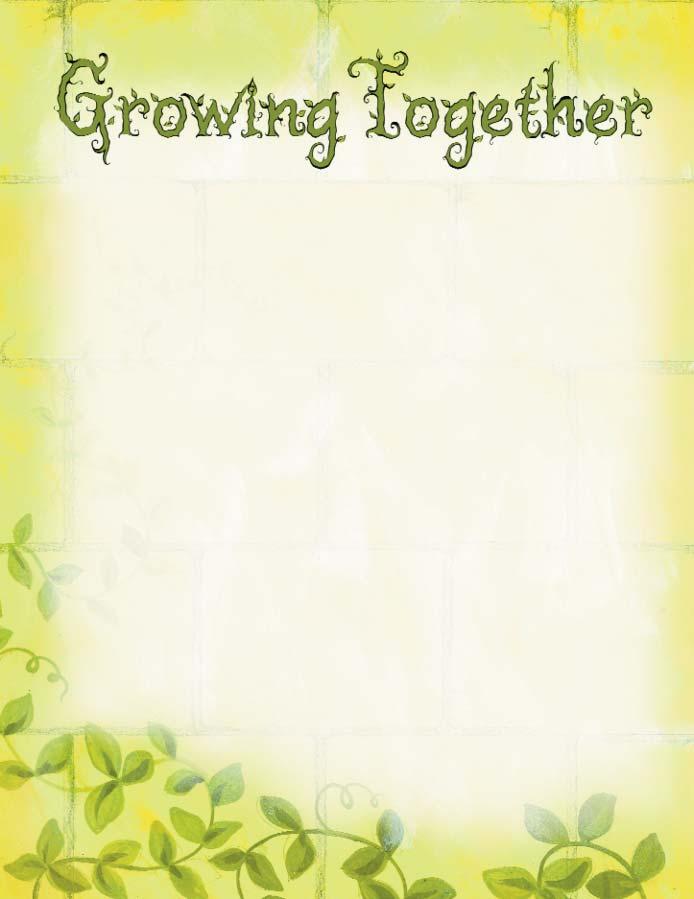
“I don’t believe that at all,” said David. “He will be delighted, so will Mom. We were just saying how we missed having any relatives at my Bar Mitzvah. I will go and fetch him.”
Before Benny could protest, he went quickly back into the hall to find his father. Within minutes a somewhat confused Mr. Raben was following his son towards the car outside. Benny was standing next to it, his hands in his pockets looking frightened. On seeing him, Benny came over to David. They watched David’s father talking to Benny’s father through the window. He then got into the car and the boys, mostly silent waited for their fathers to talk.
When David’s father emerged after about fifteen minutes, the boys could see he had tears in his eyes. “Come into the hall, boys,” he said. “Your Mother is probably wondering where we all are.”“Chaim has gone to fetch the rest
of the family, our family,” he added. “We called them and told them to get dressed, so they won’t be long.”
Mrs. Raben was waiting for them. He said a few quiet words to her, and then continued to play the perfect host to all their guests.
Half an hour later, the Rabinowitz family arrived, and they were greeted with hugs from the Rabens and escorted to places which had been created for them at the main table.
It became time for Mr. Raben to make a speech:
“Ladies and Gentlemen... or should I say, friends, because you are all our friends, our really treasured friends.” He went on, a natural speaker, catching the attention of his guests.
“We Jews have often found ourselves separated from our relatives, our family, by cruel circumstances, perhaps the latest one being the Jews of Russia behind the Iron Curtain, separated from loved ones for decades; other families were separated and lost in the concentration camps. My father was lonely. I had always thought he was an only child, but almost 20 years ago, when he was dying, he kept calling out to someone called Benny who I realized must have been his brother. He would cry and beg him to come to him. We all assumed that he had been somehow killed or lost during the war.
“We were lonely as a family in that we had no relatives living here, friends, yes, wonderful friends, but no relatives. The few we have live in Israel and could not come tonight.” He looked at his cousin, “But we do have family here tonight, my cousin Chaim is here with his wife, Judy and their children Benny, Baruch and Leah. I want to tell you all that I met them for the first time tonight.”
The crowd began to clap and he waited for silence. “But it was not circumstances that divided us, that held us apart. 40 years ago, two brothers, neither of whom is alive today, had a quarrel.” He broke down, weeping, totally overcome, signaling David to continue.
David picked up his well-rehearsed Bar Mitzvah speech and then turned it face downwards on the table.
“Mom, Dad,” he began, “my Uncle Chaim and family.”
Again everyone clapped.
After a pause he picked up his Bar
Mitzvah speech and began to read.
“Becoming Bar Mitzvah means I have become answerable for all the Mitzvoth. I have taken Torah observance on and will continue to do so. For centuries, Jews, faced a death full of meaning rather than give up their adherence to Mitzvoth. Here in America where I have freedom, I will be more prepared for a life full of meaning, as I too will be adhering to the Mitzvoth.
“On Shabbat, I became Bar Mitzvah and was called up to the Torah. Today I put on Tefillin, tomorrow I am going to put on Tefillin, and please G-d all my life I will
these years, unfortunately, my family has been separated by unnecessary anger. Please, just try to think if you have cut anyone off, or distanced yourself from anyone who should really be close to you. Please invite them for Rosh Hashanah.”
It was in shul on Rosh Hashanah that David realized that his words had impacted people at their shul. It was first Mr. Greenberg who came up to him, thanking him for giving him the insight and the courage to phone his distanced brother and invite the family for the first night of Rosh Hashanah. Mrs. Weinstein told him shyly that her husband had had a quarrel with her parents three years ago but now invited them for Rosh Hashanah, (he said he would manage somehow to get along with them.) Several more people came to him with similar stories.
And then Richard, a man in his forties, came to shake David’s hand.
“I have made a resolution, because of you,” he announced.
Waiting for a similar story to those he had been hearing, he was surprised.
continue to put on Tefillin. I am also working on steadily becoming more Torah observant as well.
“Mom has even turned our home kosher in the last month for me,” he added.
He put his speech down with a sigh of relief and said, “I want to thank you all for the many generous gifts and we will have a great time opening them.” He paused and took a deep breath.
“I would like to ask you all just to give me one more gift, a Rosh Hashanah gift as it is only two weeks till Rosh Hashanah. My father was saying that throughout the centuries Jews have been separated from one another, from their families, by cruel circumstances and governments. But all
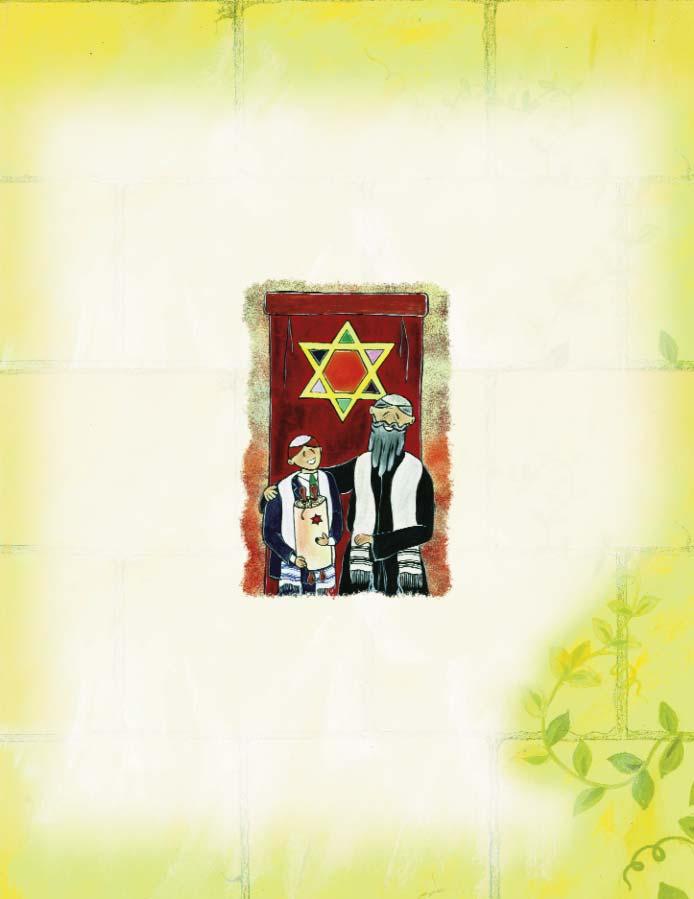
“When I was Bar Mitzvah, many years ago, I decided that I would continue putting on my Tefillin, but never did. People told me that I was really expected to wear them only once, on my Bar Mitzvah, so I didn’t bother. When you said in your Bar Mitzvah speech that you were going to put on Tefillin forever I felt a pang of sadness because I knew, or thought I knew, that such a decision would not be acted on. However I have been speaking to my friend Bill Cohen, and he tells me he has seen you put on Tefillin every morning before school. Well it looks like times have changed. I am going to get myself a pair of Tefillin and this time I am going to put them on every day.”
David smiled, “Times have indeed changed... for the better.”
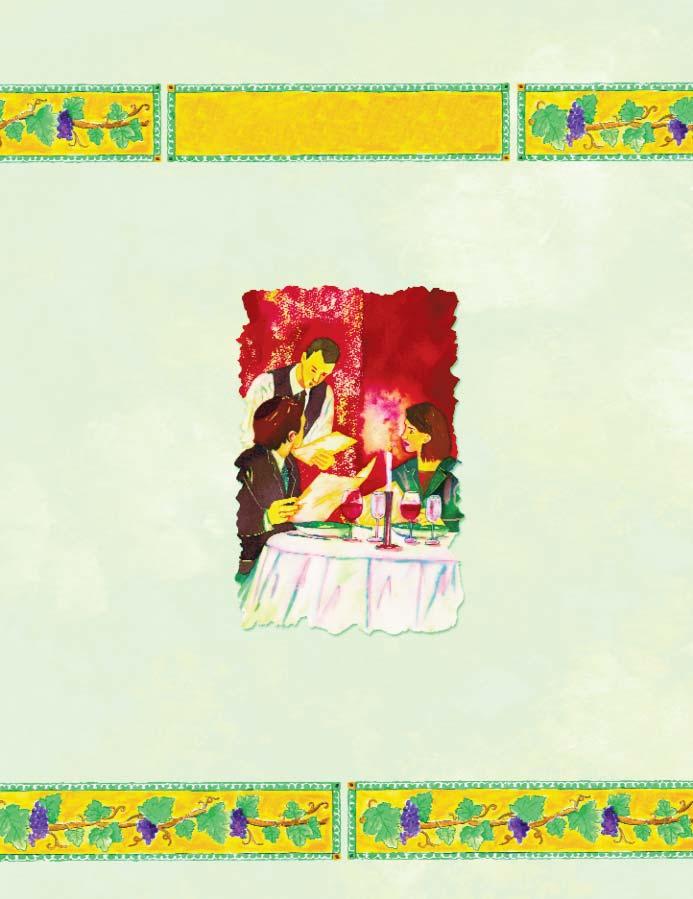
On East 53rd street, just a couple of steps down from sidewalk level, nestles a lovely upscale restaurant named ‘Gusto va Mare,’ which, translated, means ‘Taste of the Sea.’
We went there for lunch one Sunday, my husband and I and our two small children. On walking in, we found an old world Italian ristorante that serves fish and dairy dishes.
Although not particularly child-oriented, they did not seem fazed by the children.
We were warmly welcomed by the staff and were seated and offered drinks immediately.
I ordered fresh, frozen strawberry grannada, which was absolutely refreshing. They offer various freshly squeezed and frozen fruit juices, sodas and a variety of wines.
Old-fashioned subdued lamps cast soft light over the blue and white tables. A brick wall divides the restaurant into two sections. The wall affords a separation between families with children, and businessmen or other patrons who prefer a quieter dining experience.
Hot crusty rolls were brought to the table along with spiced olive oil and the menus. The menus were concise and the dishes were described quite thoroughly, which is helpful for anyone with food allergies.
Elana Sniad, mother of six children, ranging in age from 5 to 26, runs the restaurant with extreme efficiency. She directs and oversees every detail, both in the kitchen and in the restaurant itself. Elana’s Mother is from Madrid (Spain), and her father from Milan (Italy). Her Italian grandmother passed on her love of preparing good food to Elana.
We did not have to wait long for our food. They do not have a special children’s menu but generally suggest fresh pizza, a highly successful idea. The children liked the pizza enough not to want to share too much of it with us, but what we did taste was excellent.
I ordered the Bruschetta to start - grilled bread with fresh mozzarella and garlic herbed tomato - which was seasoned perfectly. My husband, a vegetarian who does not eat cheese, ordered the Lentil Croquettes served with a Dijon mustard sauce. I tried one and found it tasty.
Elana told me that they do not cut up the vegetables until an order comes in. This has a special impact on their Tuscan french fries, which of course we ordered.
They are shoestring thin, crisp and absolutely delicious. Despite the spices, even the children loved them and we ordered more.
My husband and I both tried a fish dish, called Mahi Mahi, a Hawaiian fish with apricot sauce served on a bed of mixed greens, which was very good.
The ‘Lasagna Combinazione’ was my favorite. These combination platters are regarded as their specialty. The chef creates a plate with four different types of lasagna each with a different filling and sauce. For someone who loves lasagna or wants to try various flavors, this is a must. ‘Gusto va Mare’ also makes combination gnocchi or combination fish platters.
For those on a diet, they have an assortment of low-calorie soups. Since everything is freshly prepared, most dishes can be made without cheese or extra sauces. As a rule, they use only olive oil for cooking, and fresh herbs whenever possible. Everything is freshly prepared including their homemade desserts.
For dessert, we ordered the cheesecake, the deep chocolate cake and the baked figs with a lambrusco sauce, to share. All were excellent. The cheesecake was creamy; the chocolate cake moist and faintly bittersweet, perfect for the chocolate-aficionado; the figs were delicious in their wine sauce. They also have a fine selection of coffees and cappuccinos to complete a fine meal.
‘Gusto va Mare’ is a classy Italian specialty restaurant, and would be perfect for a business lunch or dinner date. It is well worth a visit.
Most of our readers know that the ~ Laboratories is involved in kosher supervision on an international level. The ~ pioneered supervision in the Far East, and we have extensive activity in Europe and Asia as well.
Our rabbinic coordinators and I are frequently on the go, because proper supervision requires a hands-on approach.
Occasionally, our travels take us to places that arouse poignant emotions and memories. As the centuries have gone by, Jewish dispersion has left its mark in city after city and country after country. Sometimes the memories are sweet, but often they are bitter with terrible sorrow. On a past trip to Montpelier, France, where I traveled to monitor our supervision of Perrier, I was reminded of the sorrow of the town.
Montpelier, located not far from the Spanish border, seems like a typical French town. However those familiar with history know that between 700 and 800 years ago it played an important role on the stage of Jewish life. At the time, the Maimonidean controversy, concerning the permissibility to study philosophy, was raging. On one side stood those who supported Maimonides - the Rambam - and his Moreh Nevuchim, the classic philosophical work that had deep roots in Aristotlian thought. On the other side stood the opposition: great rabbis who opposed such study.
One of the Rambam’s opponents was Rav Avraham min Hahar, whose name literally means ‘Rabbi Avraham from the Mountain.’ His name originates from the fact that he hailed from Montpelier - “Mont” means mountain in French, although interestingly there are no mountains there.
During the same period, Montpelier was the site of a terrible event - the public burning of the Talmud by the Church. When one reflects on all these events, one is overwhelmed by our Jewish experience in exile.
Turning my attention to the present, I met with Rabbi Peretz Partouche. He is the Rabbi who heads the thriving Jewish community in Montpelier. Among his many roles is that of mashgiach at the world famous Perrier factory, which is located in the small village of Vergezze.
Eyebrows naturally rise when we talk of kosher supervision for Perrier. Why, after all, should it be necessary to hire someone to check the kosher
status of water?
The surprising answer is that good reasons exist for having a mashgiach at Perrier. One reason is that Perrier water is carbonated. Carbon dioxide gas can come from various sources; some are natural, while others are not. One of the sources of Carbon dioxide is the gas emitted during beer production. The use of such a gas would make the product unsuitable for use on Passover.
Most water companies want their product certified for Passover; this necessitates checking the source of the Carbon dioxide gas, which they use in their products.

The gas used in Perrier is natural gas, local to Montpelier. In fact, it comes from the same underground area as the water itself. Even the sand used to produce Perrier’s bottles is of local origin.
The production system at Perrier is fascinating. The entire process - from turning sand into glass bottles to the finished product - takes place in one enormous room.
There is another important factor to consider in the case of Perrier, and that pertains to flavored waters, which Perrier also produces. Some of these flavors are produced in this Perrier facility, while others are manufactured at other facilities.
by Cannes.Rabbi Pinson is involved in the supervision of Perrier because some of the flavors and extracts used in Perrier products are produced nearby, in Grasse. This city, located in the mountains, is renowned for flavor production.
The synagogue in Nice used to feature a kosher restaurant, which was recently burned down by an anti-Semitic act of arson perpetrated by an Arab cook. It will hopefully be rebuilt soon.
Nice also evokes special memories of the Lubavitcher Rebbe. It was to Nice that the Rebbe and his wife fled from the Nazis. There is an interesting anecdote, which illustrates the Rebbe’s resourcefulness and deep concern for fellow Jews. In order to obtain a hotel room, refugees from the Nazis had to prove they had financial means. Understandably, in the dire circumstances of the War, many people arrived almost destitute. The refugees could barely pay for the hotel room itself, let alone show ‘financial security.’
The Rebbe had in his possession one hundred American dollars, a very significant sum during that period. He lent the money to those in need so that they could secure suitable lodging. Each person would show “his” hundred-dollar bill and receive a room. The bill would then pass on to the next person. The Rebbe did this as long as it was necessary.
Natural flavors can contain products of animal origin. In order to monitor these flavors, we call upon the expertise of Rabbi Partouche.
After leaving Perrier, I took a four-hour train ride to Nice. There I met Rabbi Yosef Pinson, who runs a beautiful school in Nice, in addition to overseeing Jewish communal activity in near-
Today, the deeds the Rebbe performed in France over fifty years ago are bearing splendid fruit, from Paris down to the Riviera. The evidence is clear: Thousands of Torah observant Jews live in cities throughout the country. May G-d grant the Rebbe’s burning desire to bring about the final redemption, with the imminent coming of Moshiach.
EREV YOM KIPPUR, THE FOLLOWERS OF REB LEVI YITZCHOK OF BERDITCHEV WOULD LINE UP TO MEET THEIR REBBE. THEY WOULD SUBMIT THEIR NAMES SO THAT HE WOULD PRAY ON THEIR BEHALF. KNOWING THAT THEY WERE IN THEIR REBBE’S PRAYERS, THEY COULD REST ASSURED THAT THEY WOULD MERIT A POSITIVE INSCRIPTION FOR A SWEET NEW YEAR.
ONE YEAR, R. LEIVIK LET IT BE KNOWN THAT FOR EACH PRAYER OFFERED UP, MAN, WOMAN OR CHILD WOULD HAVE TO PAY ONE GOLD COIN. FOR EACH PERSON, A COIN.
I will mention you all in my prayers.
Thank you, Rebbe. Now with peace of mind we face the new year
Rebbe, I am a widow. All I possess is my baby and a single gold coin. Please pray for us both.
With a wife and ten children, I had to come up with twelve gold coins! I had to sell my horse.
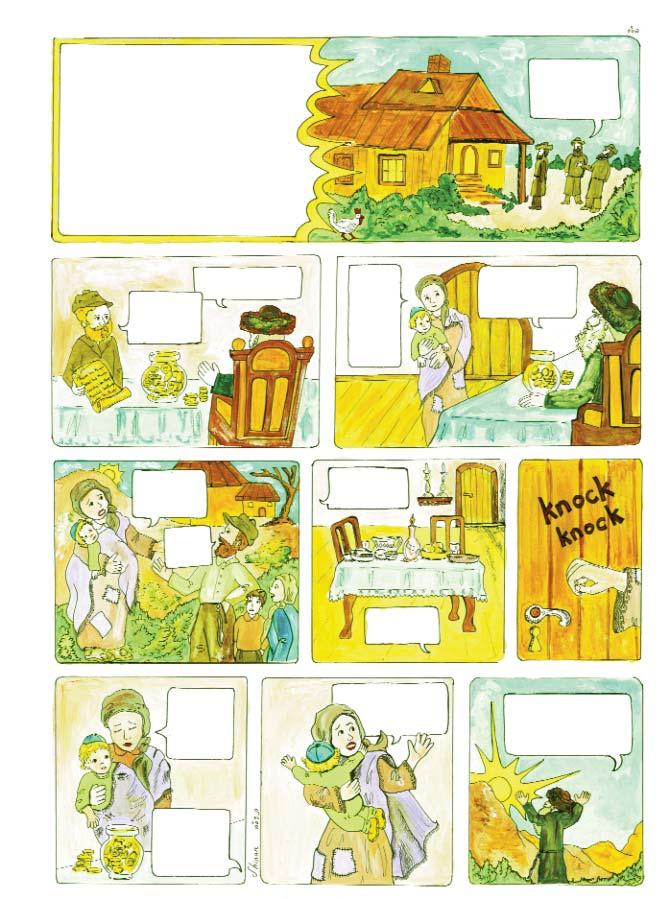
Please, sir. Have mercy. Time is running out.
I’m so sorry. I have nothing.
Rebbe, I have searched and begged. I could not come up with another gold coin. I will place you on my list. The child is young and pure. Hashem will have mercy on his soul.
Please, Reb Leivik. Have your meal. The fast is about to begin.
I am sorry. You must pay one gold coin per person. There is still time. Hurry and collect more money.
No, I must wait for the widow. I think I hear her now.
Rebbe, NO! You don’t feel the heart of a mother! Accept my coin and pray for my child alone.
Master of the Universe; Behold the love of a mother for her child. G-d in heaven, Your people are Your children. Show us mercy and grant us a sweet new year.